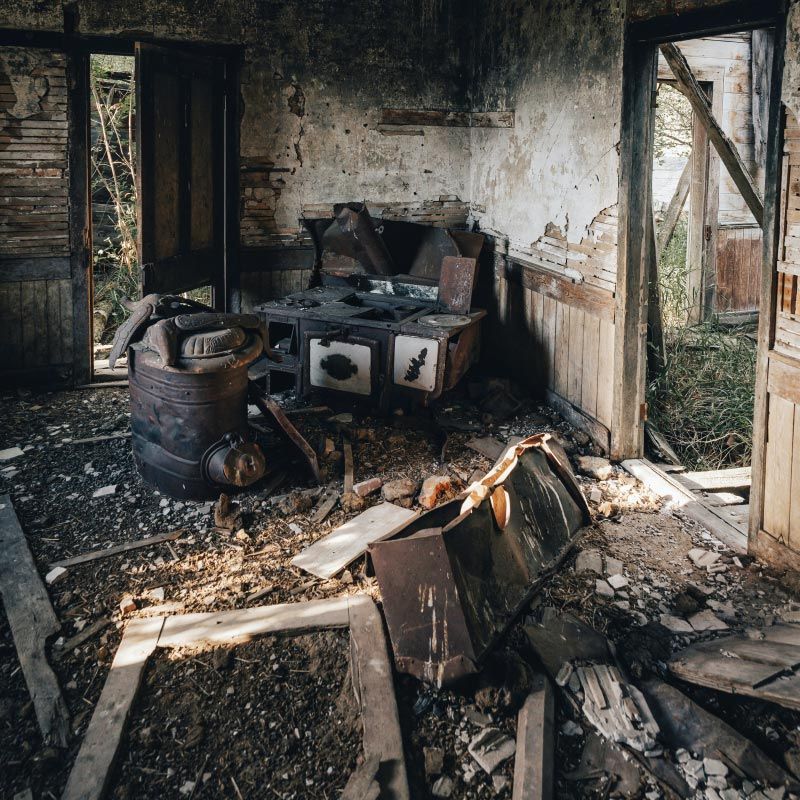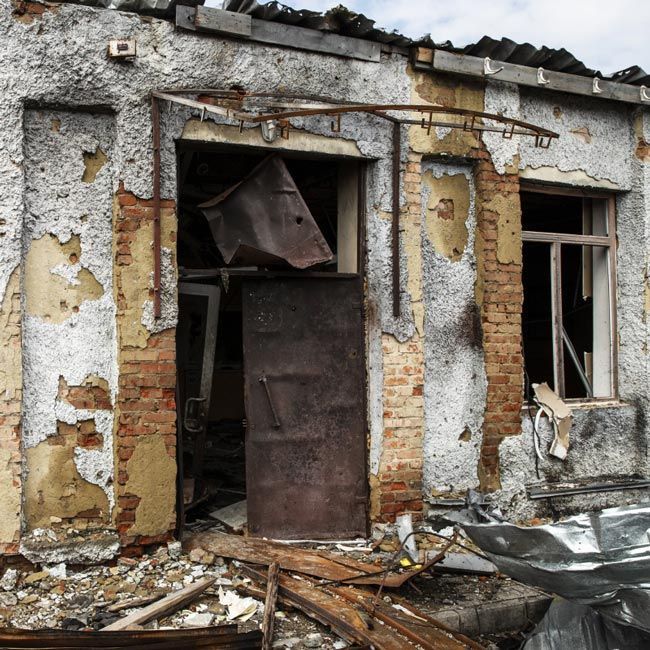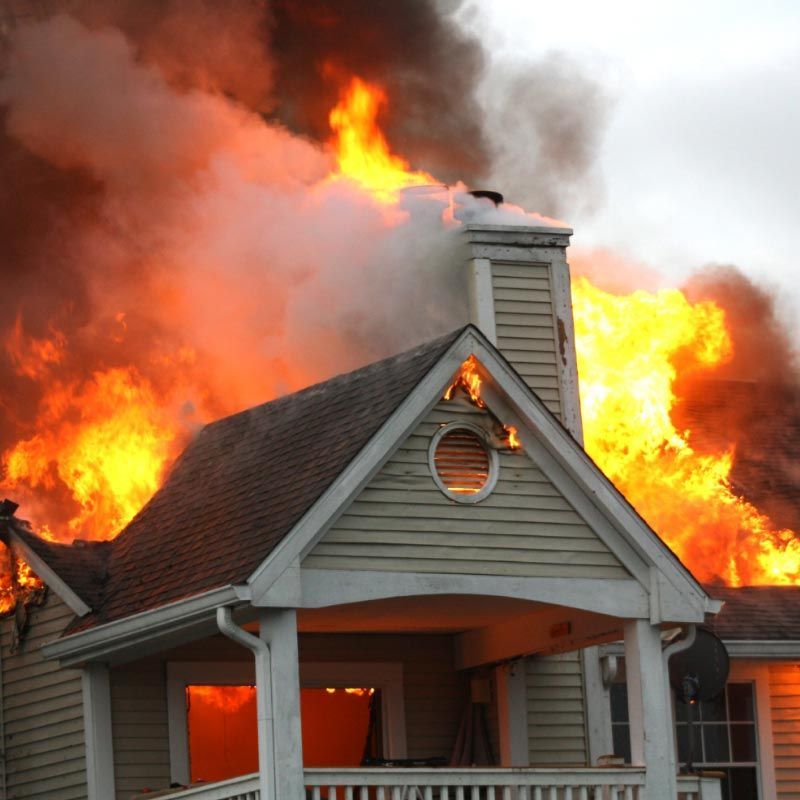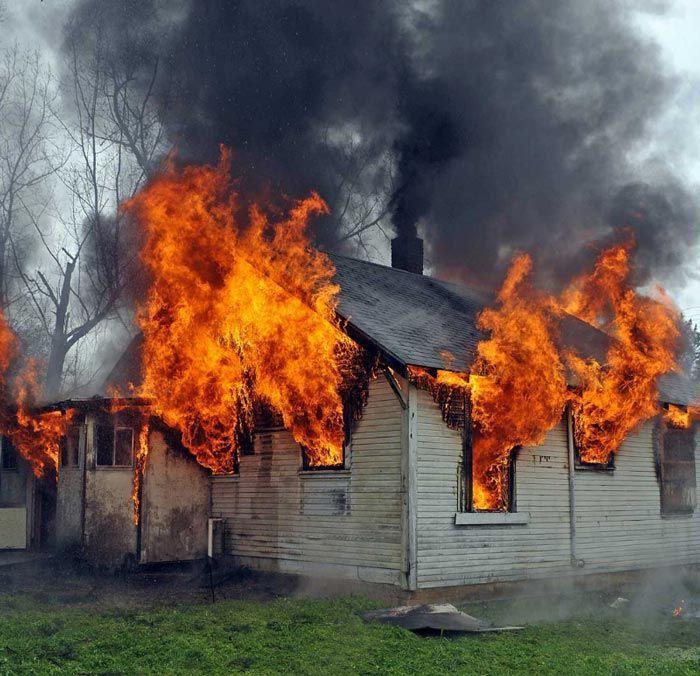Guide to Finding House Fire Records
Free Offer Form
House fire records are public records that contain all the important details about a fire incident.
These records can help verify the history of a particular place.
You can obtain a fire incident report when you contact any fire department in your city. You can request it through an online form, when you visit in person, or through the mail.
It may take around 10 business days before you receive the record. Note that you'll have to follow the instructions on the form and pay the requisite fee.
To find out more about how to obtain house fire records, keep reading below.
The Importance of Fire Incident Reports
A fire incident report is a public record that explains the fire history of a certain house and the land it's on. It explains details like the cause and damages a fire has caused.
Role of Fire Incident Reports in Property Transactions
Property that sustained fire damage might be compromised even if you can't find signs that say otherwise. So, when someone wants to buy property, it's ideal to contact a professional inspector.
A fire incident report can help shorten inspection time since it already contains all the fire damage.
Thanks to that, you can also find out how those damages were repaired — such as if the previous owners got the house professionally cleaned and renovated.
Fire Incident Reports for Insurance Purposes
One of the tips for house fire claims includes documenting property damage and loss. As such, a fire incident report can ensure you get what you're owed by insurance companies.
After all, these public records are authoritative accounts of the fire.
For example, even if you have coverage for cigarette-started house fire, you may not be reimbursed if the record says the fire was intentionally set.
Fire Incident Reports for Legal Purposes
Incident reports capture crucial information when they're still fresh, making them
reliable documents in court. They also support other physical evidence and stories from witnesses.
Can I Sell a Fire Damaged House National?
Yes. You can sell a fire-damaged house. However, it may be harder to sell in the local National real estate market in as-is condition. You would have to make repairs and possibly rebuild most parts of your house before a buyer takes interest in the property. Your best option when selling a fire-damaged house is a cash buyer. They buy burned houses as-is so you don't need to spend money on repairs. They'll handle all the cleanups and renovations for you, however, expect that their offer may be below the cash value of your property.
How to Obtain Fire Incident Reports
Fire incident reports are public records, so anyone can request to access them. Here's how to obtain them.
Contacting the Local Fire Department
Fire incident reports are created by the fire department anytime anyone is dispatched to any address in and out of the city to assist with situations like fires or rescues.
How you'll request a report may differ per city, but the process is generally straightforward. Many departments let you file a request online, but you can also request by sending a form through mail or in person.
Even if you request the form through mail or in person, you can typically download and print the form on their web page.
Information Required for Request
The request form will typically require the following information:
- Your name and address
- Incident date
- The specific address where the fire occurred
- Incident number (if available)
Remember to sign and date the form.
Possible Fees and Processing Time
The fee and processing times may vary per city, but processing requests may take up to around 10 business days.
The fee may range from $1 up to $35.
Online Resources for Fire Incident Reports
The National Fire Incident Reporting System (NFIRS) is a voluntary reporting standard that collects incident data — from fires to natural disasters.
Meanwhile, the National Association of State Fire Marshals (NASFM) is an organization of the most senior fire officials in the US.
They help record undetermined and missing data on the causes of fires in the NFIRS's archives.
Thanks to them, there are now archives with digitized resources on the fire history of various places.
How to Find General House Fire Records Online (Including Free Options)
While official fire incident reports from fire departments are a primary source, your search for information about a house fire isn't limited to them. Various online avenues can help you uncover records or mentions of past fires at a property, often for free. These methods can supplement official reports or provide clues when direct reports are difficult to obtain. Remember that information found through these general searches should be verified whenever possible, especially for legal or transactional purposes.
Expanding your online search for house fire records involves thinking like an investigator. Beyond specific portals for incident reports, consider broader search strategies. This includes using major search engines with targeted keywords, exploring digital archives of local news publications, and checking publicly accessible property databases. Each of these resources can hold valuable pieces of the puzzle, helping you determine if a property has a history of fire. The key is to be persistent and methodical in your search, cross-referencing information from multiple sources if possible.
Many of these broader search methods offer free access to information, at least at a preliminary level. For instance, searching news archives or using advanced search operators on Google costs nothing but your time. Some government-run property databases also provide basic information without a fee. While some specialized property history services are subscription-based, they often provide a certain amount of free data or trial access. Being aware of these free avenues can significantly aid your research without incurring immediate costs.
Utilizing Search Engines and News Archives
Search engines like Google or DuckDuckGo are powerful tools if used correctly. Try combining the property address with terms like "fire," "house fire," "structure fire," or "fire department response." Enclosing the address in quotation marks (e.g., "123 Main Street" fire) can yield more specific results. Don't forget to check the "News" tab in search results, as local media outlets often report on significant fire incidents. Many local newspapers and television stations also maintain online archives that you can search directly, sometimes dating back several years. These archives can provide dates, details about the severity of the fire, and sometimes even follow-up stories on rebuilding or investigations.
When searching news archives, look for variations in how the address might be reported or for mentions of nearby landmarks if the exact address isn't yielding results. Sometimes, initial reports might be vague, but follow-up articles could contain more precise information. Patience is key, as sifting through search results and archive pages can be time-consuming. However, uncovering a news report can provide substantial evidence of a past fire, often including details not found in a concise official report.
Exploring Online Property Databases and County Records
Many counties or municipalities offer online access to property records through the county assessor, recorder, or clerk's office. While these databases primarily focus on tax information, ownership history, and permits, they can sometimes contain clues about past fires. For example, records of major repair permits, demolition permits, or significant changes in assessed value following a specific date might indirectly indicate a fire. Some of these databases are free to search, while others might charge a nominal fee for accessing detailed documents.
Beyond local government sites, several commercial websites compile property data from various public sources. Some of these platforms may offer limited free search capabilities or provide basic property history reports that could mention significant events like fires, especially if they led to insurance claims or structural reassessments. While comprehensive reports usually come at a cost, the free previews can sometimes be enough to indicate if further investigation is warranted. Always be mindful of the source and potential age of the data when using these third-party services.
Checking Community Forums and Social Media (with Caution)
Local community forums, neighborhood groups on social media, or even online discussion boards can sometimes hold anecdotal information about past events, including house fires. People might recall incidents in their area and discuss them online. Searching these platforms for the address or street name along with terms like "fire" could uncover discussions or mentions. This method is less reliable and more informal than official records or news archives but can occasionally provide leads or corroborating details.
It's crucial to approach information found on social media and forums with a high degree of skepticism. Memories can be inaccurate, and details can be exaggerated or misremembered. Such information should ideally be used as a starting point to seek more concrete evidence from official sources or news reports rather than being taken as definitive proof on its own. However, in some cases, especially for older incidents where online news archives are sparse, these community sources might be one of the few available avenues for initial clues.
Ultimately, finding house fire records online, especially free ones, often requires a multi-pronged approach. By combining searches for official reports with broader online investigations through search engines, news archives, and property databases, you increase your chances of uncovering the information you need. Always prioritize verifying data from multiple reputable sources whenever possible.
Understanding the Fire Incident Report
An incident report is a public record that can be consulted by members of the public.
Here are several things you may find in these records:
- Name of the fire department that responded to the fire
- Date and time of the fire
- Location where the fire occurred
- Cause and damages caused by the fire
- Any injuries or fatalities caused by the fire
Identifying Signs of a Previous House Fire
Buying a house with previous fire damage can be very dangerous. After all, it could cause problems if not renovated and cleaned properly. For example, it could collapse due to structural damage or cause health problems because of mold.
Statistics show that house fires have occurred more often than you think. It's always a good idea to have a property assessed and see if the previous owners managed to address any fire damage.
Physical Signs in the Property
Fires, along with the resulting soot and smoke, cause physical damage to a property, so you might not have to search too hard for signs.
Smoke Damage and Soot
Search for soot and smoke stains on the walls, ceiling, and floor. These are typically dark brown to black in color.
Soot is powdery or flaky and can be hard to remove due to its oiliness.
Wet smoke damage results in fine residue that doesn't stick to surfaces as much. However, the particles can enter cracks, making them harder to remove. On top of that, it also has a strong odor.
Dry smoke damage has a strong smell and is hard to remove. This produces a thin, sticky residue.
Damages to Windows and Walls
You should also check for water, pressure, and heat damage that may have changed the home's structural integrity.
Search for any signs of deformation and melting. For windows, check for breaks and cracks or signs that the glass or frames have been repaired.
You should also try to find water damage that can cause mold.
Smell of Smoke
Eradicating smoke smell after house fire can be hard work. You can do things like air out the house and clear soot and smoke, but the smell may remain.
However, a professional can get rid of the extensive smoke smell by also helping repair house fire damage. For example, they can replace drywall that was soaked by water.
If you smell smoke when you enter a house, it's possible that the previous owner didn't address the fire damage properly.
Verifying Signs of a Fire
After you search for signs of a previous fire, you can verify the signs by looking at a fire incident report.
These records can also give additional information on other types of damage the building has sustained that you might not have noticed.
The Process of Selling Fire Damaged Property to a Cash Buyer
The process of getting a cash offer for a burned house is pretty much the same as any property type. However, it is best if you can contact your home insurance company first before getting an offer for your house after a fire. Your National home insurance company can help assess the extent of the fire damage as well as the repair costs. This can help you decide whether selling a house as-is to a cash buyer is really the right path to take. Once you have decided that you really want to get a cash offer, here are the next steps you should take.
Important note: This doesn't apply to all cash buying companies.
1. Request a Cash Offer
You can easily find cash buyers in your area by searching online. Once you found a reputable cash buyer, head over to their website to fill out a form or give them a call to ask for a cash offer. Most cash buyers and real estate investors give no-obligation cash offers so you can still ask other cash buying companies how much they can buy your fire-damaged property. If you are unsure about the background of a cash buyer, you can always ask them for proof of their source of funds.
2. Welcome the Cash Buyer into Your Home
The cash buyer or real estate investor may want to check your fire-damaged property for the repairs and improvements it needs, especially its roofing, walls, foundation, etc. You won't have to pay for these repairs when selling a National house to them, but experienced home buyers or real estate investors consider repair costs to make an accurate cash offer.
3. Review the Contract and Sign
Once you accept the cash buyer's offer on your fire-damaged home, they would furnish a sales contract and send it to you electronically. You will be given time to go over the terms and ask questions. After everything is settled, sign the contract to make the deal with the National cash home buyer official.
4. Closing
During closing, expect less paperwork since there are no lenders involved. After you have signed the minimal necessary paperwork and the National deed is transferred to the cash buyer's name, you'll get your cash in your bank account. If you aren't confident attending the closing by yourself, bring a real estate attorney with you.
5. Set Your Preferred Day to Move-Out
If the property has minor fire damage and you are still living in it, communicate to the cash home buyer when you want to move out. This is also a good time to ask for a sale-leaseback agreement if you don't have a place to crash on while you are still looking for a new National home.
Role of the Fire Department
A fire department will put out fires and create incident reports regarding the fires. They'll search for the right records for you as well when you send a request form and send payment for the requisite fee.
Responsibilities of the Fire Department
The fire department has several broad responsibilities, such as the following:
- Assessing fire- and rescue-related risks in their neighborhoods and making provisions for prevention.
- Extinguishing fires.
- Rescuing people in the event of other emergencies.
How Fire Departments Document Incidents
Fire departments record incidents through the fire incident report. These records are preliminary assessments made during or after the fire.
It includes relevant details about the incident — such as the time, location, and damage caused by the fire.
These records assist fire departments with improving their fire response times and effectiveness, which can save more lives.
Alongside those records, fire investigation reports are also created.
These records are done after the fire scene is assessed by fire investigators, i.e., after the fire has been put out. They'll be used to help determine the cause of the fire.
Frequently Asked Questions
Having records that tell the fire history of a building informs people of the possible risks of owning or stepping foot in it.
Learn more about finding house fire records here.
How Long Does It Take to Get a Fire Incident Report?
A fire department can typically provide you with a fire incident report within 10 business days of request. Remember to account for the length of a fire investigation and the process of creating the related records.
If you want to request a report of a very recent fire, it might take longer since they'll still need to determine and record specifics — such as the cause of the fire.
What Information Is Included in a Fire Incident Report?
You can expect a fire incident report to record the following information:
- Name of the fire department that responded to the fire
- Date, time, and location of the fire
- Cause of the fire
- Damages caused by the fire
- Injuries or fatalities caused by the fire
Can I Get a Fire Incident Report Online?
Yes, you can send a request to get a fire incident report online. Just follow the instructions that the fire department's web page will provide and see how you can pay for the fee.
How Can I Tell if a House Has Had a Fire Before?
There are many ways to tell if a house previously experienced a fire. These include:
- Smoke and soot stains
- Melted or deformed materials (like plastic, metal, and glass)
- Smoke smell
- Charred or blackened areas
- Broken or cracked window
You can request a fire incident report to verify if the house has experienced a fire before.
What Are the Responsibilities of the Fire Department in Documenting Fire Incidents?
Fire departments are responsible for putting out fires within their city. Additionally, they also make records that document fires.
These records contain details like the cause of the fire and any injuries caused by the fire. By being as accurate as possible, these documents can improve the fire department's response times and effectiveness.
They may even help fire departments assess risks in the city where they're located and implement prevention strategies.
Are house fires public record?
Generally, yes, information about house fires, particularly official fire incident reports, is often considered public record. This means you can typically request these reports from the local fire department that responded to the incident. However, accessibility can vary by jurisdiction, and some sensitive information within the report, such as personal details of occupants or ongoing investigative material, might be redacted to protect privacy or legal processes.
Conclusion
An incident report records who responded to a fire, when and where it occurred, what damages it caused, and why it happened.
You can request and obtain these records online, when you visit the fire department in person, or through the mail. Just
follow the instructions on the web page and pay the required fee.
These documents capture the fire incident as accurately as possible to help the public find out about the fire history of a place and the fire department to improve their services.
Aside from the fire department, you can also search documents
online in archives or libraries that may provide a record of the history of a piece of property and the land it's on.
National Resources
- Selling a Fire Damaged House National
- Selling Inherited Property National
- Selling a House in Probate National
- How to Sell a House by Owner National
- How to Sell Rental Property National
- Stop Foreclosure National
- Selling a House during Divorce National
- How to Sell a Hoarder House National
- Can You Sell a Condemned House National?
- Can You Sell a House in Foreclosure National?
- How to Sell Rental Property with Tenants National
- Taxes on Selling a House National
Free Offer Form
Author: Chris Charles
We buy fire damaged houses because we like taking on the challenge and making a win win for sellers looking to sell. We work with our partners nationwide and are experienced in dealing with the city if its already been condemned. Request a cash offer to have a chat with us today.
Sell Fire Damaged House for Cash Quick
Sell Your House Fast, To A Legitimate House Buying Company You Can Count On. ✔️ Free, Easy & ✔️ No Pressure Process. Find Out How We Buy Houses!
Sell Fire Damage House in California
Sell Fire Damaged House in Ohio
Sell Fire Damaged House In North Carolina
Sell Fire Damaged House In Michigan
Sell Fire Damaged House In Massachusetts
Sell Fire Damaged House In Colorado
Sell Fire Damaged House In Minnesota
Sell Fire Damaged House In South Carolina
Sell Fire Damaged House In Alabama
Sell Fire Damaged House In Louisiana
Sell Fire Damaged House In New Hampshire
Sell Fire Damaged House In Maine
Sell Fire Damage House in Texas
Sell Fire Damaged House in Florida
Sell Fire Damaged House In New Jersey
Sell Fire Damaged House In Virginia
Sell Fire Damaged House In Indiana
Sell Fire Damaged House In Kentucky
Sell Fire Damaged House In Oregon
Sell Fire Damaged House In Oklahoma
Sell Fire Damaged House In Connecticut
Sell Fire Damaged House In Utah
Sell Fire Damaged House In Rhode Island
Sell Fire Damaged House In Delaware
Sell Fire Damaged House in Pennsylvania
Sell Fire Damaged House in New York
Sell Fire Damaged House In Washington
Sell Fire Damaged House In Arizona
Sell Fire Damaged House In Missouri
Sell Fire Damaged House In Nevada
Sell Fire Damaged House In Iowa
Sell Fire Damaged House In Arkansas
Sell Fire Damaged House In Mississippi
Sell Fire Damaged House In Kansas
Sell Fire Damaged House In North Dakota
Sell Fire Damaged House In Alaska
Sell Fire Damaged House in Georgia
Sell Fire Damaged House in Illinois
Sell Fire Damaged House In Tennessee
Sell Fire Damaged House In Maryland
Sell Fire Damaged House In Wisconsin
Sell Fire Damaged House In New Mexico
Sell Fire Damaged House In Idaho
Sell Fire Damaged House In Nebraska
Sell Fire Damaged House In West Virginia
Sell Fire Damaged House In Hawaii
Sell Fire Damaged House In Vermont






